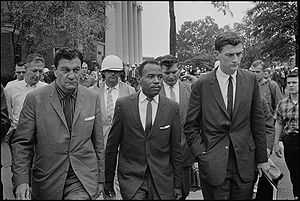John Doar
| John Doar | |
|---|---|
 John Doar (right) and U.S. Marshals escorting James Meredith to class at the University of Mississippi. | |
| Born |
December 3, 1921 Minneapolis, Minnesota |
| Alma mater |
Princeton University Boalt Hall School of Law |
| Occupation | Lawyer |
John Michael Doar (born December 3, 1921) is an American lawyer and currently senior counsel with the law firm Doar Rieck Kaley & Mack in New York.
Doar is a graduate of Princeton University (A.B. 1944) and the University of California-Berkeley Boalt Hall School of Law (LL.B. 1949). His son, Robert Doar is Commissioner of the New York City Human Resources Administration.
Civil rights career
He served as First Assistant and then Assistant Attorney General for Civil Rights in the U.S. Dept. of Justice, from 1960 to 1967,[1] during which time he was involved in several of the most significant events of the American civil rights movement. In 1961 Doar operated in Montgomery, Alabama along with his assistant, John Siegenthaler, to protect the freedom riders.[2] In 1962, Doar confronted Ross Barnett over Barnett's attempts to prevent James Meredith from entering the then-segregated University of Mississippi. He also prosecuted and convicted Collie Leroy Wilkins for federal civil rights violations in the murder of Viola Liuzzo,[3] before an all-white jury in Alabama. As a federal prosecutor Doar could not prosecute someone for murder, which was a state offence. In 1963, Doar confronted and calmed an angry mob after the murder of Medgar Evers.[4]
He prosecuted the federal case for civil rights violations against the people who were accused of lynching Andrew Goodman, James Chaney and Michael Schwerner,[4] in events which were later depicted in the movie Mississippi Burning. Doar later contributed to drafting the Civil Rights Act of 1965, which Lyndon Johnson signed in an attempt to solve some of the problems that he had observed in the deep south. In March, 1965, Doar was the first to arrive in Montgomery during the third of the Selma to Montgomery marches. He walked into Montgomery half a block ahead of the march in his capacity as Assistant Attorney General.[2]
And after
He left the government in the later part of the Johnson administration, returning only in 1974 as Chief Counsel for the United States House Committee on the Judiciary, which was then investigating the Watergate scandal and preparing articles of impeachment against Richard Nixon.[1]
Doar received the Presidential Medal of Freedom in 2012.[5]
References
- ↑ 1.0 1.1 "Doar, Rieck, Kaley, & Mack biography". Retrieved July 20, 2012.
- ↑ 2.0 2.1 Jimmy Breslin (March 26, 1965). "Changing the South". New York Herald-Tribune. reprinted in Clayborne Carson et al., ed. (2003). Reporting Civil Rights: American journalism, 1963-1973. Library of America. pp. 361–366. Retrieved 20 July 2012.
- ↑ "Introduction to John Doar Oral History". Washington University at St. Louis. Retrieved 20 July 2012.
- ↑ 4.0 4.1 John Fleming (21 November 2010). "The quiet authority of John Doar, a towering figure of the civil rights movement". The Anniston Star.
- ↑ "2012 Presidential Medal of Freedom recipients". UPI. Retrieved July 20, 2012.
Further reading
- Linder, Douglas O. (Winter 2002). "Bending Toward Justice: John Doar and the Mississippi Burning Trial". Mississippi Law Journal 72 (2). (available online)
- John Doar (1997). "The Work of the Civil Rights Division in Enforcing Voting Rights Under the Civil Rights Acts of 1957 and 1960". Florida State University Law Review 25 (1). (available online)
- "Eyes on the Prize: Interview with John Doar". Washington University at St. Louis. Retrieved 20 August 2011.
External links
|